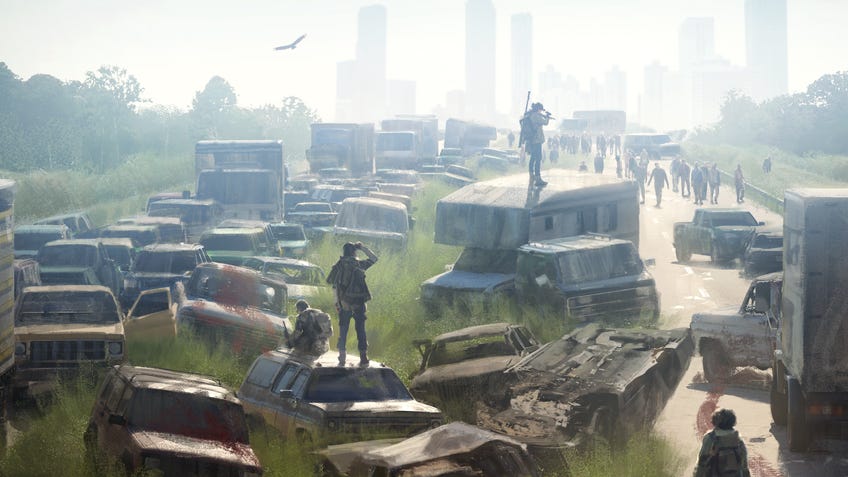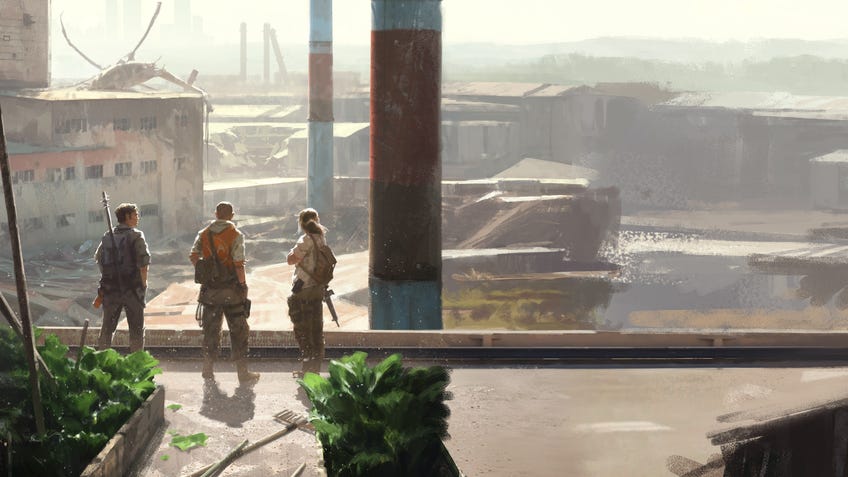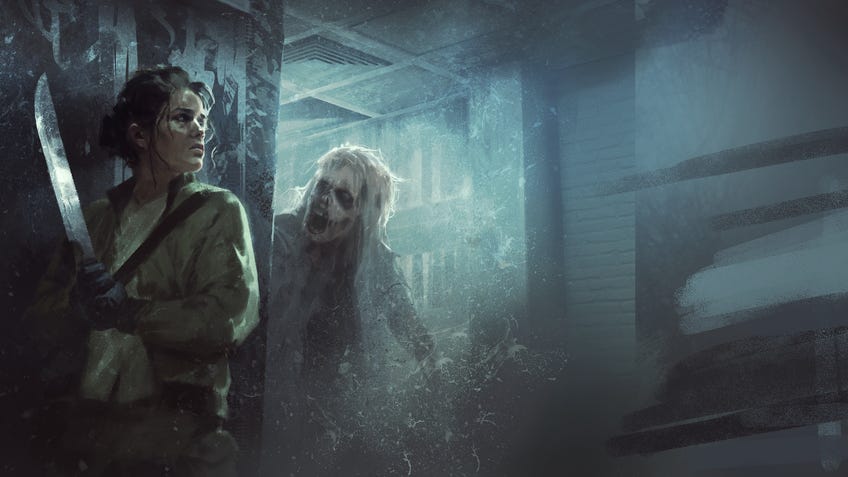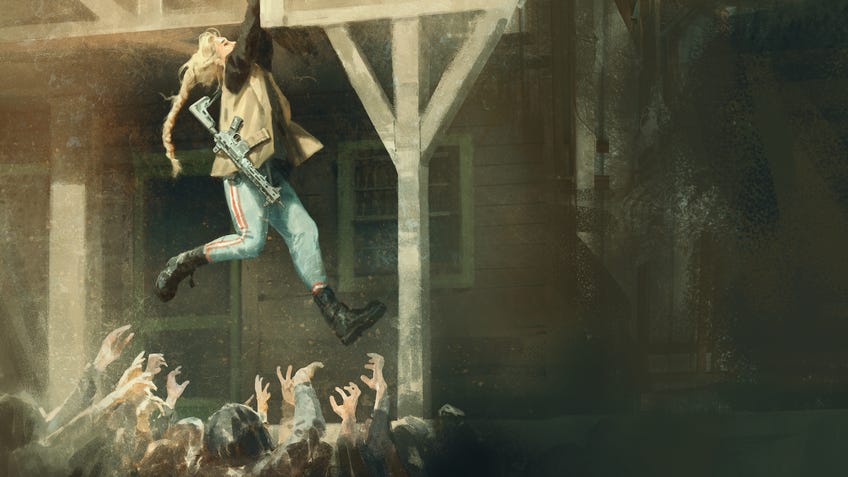The Walking Dead Universe RPG creators talk swarms, post-apocalyptic Robin Hoods and watching Daryl fall off his horse
“Fighting the swarm is always about making it out alive, one way or another.”
Swedish tabletop RPG studio Free League (or Fria Ligan in their native tongue) have created a recent legacy adapting dramatic genre fiction into tabletop experiences. Blade Runner, Alien and The Lord of the Rings by way of The One Ring deliver much more than simply slapping a collection of recognisable names onto a page alongside dice rolls and a hodgepodge of random tables.
Their latest project tackles the longrunning - and some believe long in the tooth by its conclusion - zombie television series The Walking Dead. AMC’s 11-season long saga was itself derived from Robert Kirkman and Tony Moore’s comic run by the same name and followed a ragtag group of survivors attempting to carve any semblance of life out of a post-apocalyptic American south.
The Walking Dead Universe RPG synthesises this once-popular show (which is now spinning off into at least two followup series) using a version of Free League’s Year Zero Engine and allows players to find meaning and fellowship in their own desolate world. Dicebreaker spoke with creators Mattias Johnsson Haake and Nils Hintze about tackling the studio’s most ambitious adaptation to date and how a Swedish team translated an especially American show for a wider RPG audience.
Dicebreaker: Mattias was initially intimidated by the prospect of working with AMC and the showrunners on an official RPG adaptation. How has that relationship changed over the course of the project?
Mattias Johnsson Haake: Yes, for me this was the first project where I worked directly with a big license owner, like AMC. I usually steer clear of those, probably because I want to feel in control, both creatively and in regard to the production process. But I can honestly say that working with the AMC team was - and is - great. Sure, waiting for approvals is not something I will ever learn to love, but other than that I have only good things to say - they have been incredibly supportive, encouraging, and have contributed a whole lot to the game. Many of them are gamers, and it really shows.
How has that close collaboration made TWDU RPG different from other Fria Ligan projects?
"People often say that what happens in the US comes to Sweden about ten years later, politically or otherwise, and I think that is true."
MJH: Speaking from my own point of view, there is of course a vast difference between this project and most of the other tabletop roleplaying games I am involved in - be it a Symbaroum or Coriolis adventure, or a module for Dragonbane; IPs that are ours, and where all creative decisions are made in-house. In regard to The Walking Dead Universe RPG, the world is someone else's, and it is our job to design a game that captures its feel and tone the best we can, in terms of rules, setting, and how the game plays. I am sure glad we had Nils Hintze along on this journey; he is as huge a fan of the TV series as I am, and he has since long past demonstrated his prowess for designing moody, rules-lite RPGs with a focus on interpersonal drama and intrigue.
What is the ultimate goal of a longer campaign? For example, Dungeons & Dragons is a power fantasy about leveling your character, Symbaroum focuses on seeking treasure/magic/the old kingdom, and Vaesen is about solving the mystery. Is TWDU RPG primarily focused on characters surviving as long as possible or rebuilding society? What keeps players returning to the table?

MJH: The cool thing about campaign play in The Walking Dead Universe RPG is that this question is up to the players and their characters. Survival is of course a critical concern, the world being as it is. But after that, different gaming groups will work out their own goals - be it to rebuild civilization or just make the living conditions in their haven as comfortable as they can. Why not establish a robber band inspired by Robin Hood, and steal from rich factions/communities in the area to care for the less fortunate? Either way, as in Symbaroum, the world must be explored; and much like in Vaesen, there will be mysteries to solve. And, of course, your character will evolve stat-wise, as well as in how they behave, feel, and reason. Hopefully, every gaming group will find their own reasons to start playing and to keep going.
Nils Hintze: I totally agree with what Mattias is saying. Different groups can lean into different activities, depending on what they enjoy around the table. For some, focus will be on interpersonal relationships, struggling to not have the group and the haven fall apart. Others will emphasise more traditional RPG activities, such as venturing out into the world looking for “treasure” such as medical equipment, gasoline, guns, and food. There will be monsters in the shape of other human settlements to chase away, kill, or befriend.

How did you design the walkers so that they feel like an ever-present, environmental threat without crushing the storytelling possibility space too much? Was that a difficult task compared to the rest of the project?
NH: Having the walkers act as monsters in traditional games, with individual stats, would make killing them repetitive and boring. As I see them in the TV series they are, as you say, more of an environmental threat. It is other humans that are the real monsters.
In The Walking Dead Universe RPG, walkers are not handled as individuals. Instead, there is a threat value, which says both how close walkers are and if they have noticed the player characters. The threat value goes from 0 to 6. When it is at 0 there are no walkers close by. At 1 there are some, but the characters have not been noticed. And at 2 there are a whole lot of walkers. On 3 and above the walkers have noticed the humans and are closing in, more and more for each step on the ladder. Fighting the swarm is always about making it out alive, one way or another.
At any time, a character can make a mistake or mess up in a way that will raise the threat level and make the walkers close in. This could happen, for example, when someone makes a loud noise. The game presumes there are walkers more or less everywhere, and the numbers of them are infinite - you can never kill all walkers. The characters will have to focus on avoiding them, hiding, or building walls big enough to keep them out. They are in that respect an unkillable force, like tidal waves crashing in.
How to portray the walkers was indeed one of the big questions that needed to be handled early in the game design process. I think how it was done really leaves room for storytelling, as it adds tension in every single scene and takes the game away from being a game about killing undead.
The Walking Dead is a distinctly American show grappling with distinctly American anxieties - fall of empire, individual agency vs. collective good, the rise of right-wing survivalism and fear of the other. How did the Swedish team translate the setting and subject matter into something more universally understood? Or was it more important to crystallise the feel of the television show?
NH: Even though those are American themes, I would say they are very much in focus over here in Sweden as well. People often say that what happens in the US comes to Sweden about ten years later, politically or otherwise, and I think that is true.
"The game presumes there are walkers more or less everywhere, and the numbers of them are infinite - you can never kill all walkers."
These two things - crystallising the feel of the game and grappling with themes that are relevant in our times - are in many ways one and the same; the TV series are really all about both of them. But my focus was perhaps more on finding ways to emulate the TV series. I watched and rewatched different episodes and thought about what rules would make those things happen if it was an RPG campaign and not a TV series. What rules would make it possible for Daryl’s horse to get scared and throw him off, so that he falls into a creek? How can a game make it possible for a conflict such as the one between Rick and Shane to become a part of the narrative?
What design lessons will you take with you from this project? Is TWDU RPG more of a culmination of Fria Ligan's recent spree of licensed RPG successes or the beginning of a larger project within the company?
MJH: Every game is its own particular beast. What I really love about The Walking Dead Universe RPG is how well it captures the type of stories we know and love from the TV series - stories of how complex, sometimes complicated, individuals and relationships evolve in a world where every breath you take, every move you make can be your last. This is something we always strive to accomplish, but I don’t know if I’ve ever been as happy about the outcome as in this case. At least, that’s how I feel right now, right before the general launch. Also, from my point of view, TWDU RPG exemplifies that games seldom benefit from a more-is-more approach - find out what type of stories you want the game to facilitate, then use this as a guiding star when deciding what to - simply put - include in the game book.

Finally, what sort of post-launch development can players expect? Symbaroum recently finished its grand campaign, and Blade Runner RPG will soon release its first big expansions. Will TWDURPG follow a similar expansion/supplement model?
MJH: Currently, we have plans for things to come, but we want to hear from TWD fans and our players first, see how they respond and what they want from us next. The way TWDU RPG is designed, it doesn’t really rely on expansions or supplements for players to keep playing, at least when it comes to campaign play. Then again, the Starter Set features what we call a Survival Mode Scenario; you can argue that they are second cousin to the Cinematic Scenarios of ALIEN: The Roleplaying Game - they come with pre-made player characters and deal with a critical situation that needs to be handled right away. Don’t be surprised if you see one or more of those being announced in the future.
The Walking Dead Universe RPG is currently available on Free League’s website, either as a core rulebook or a starter set that can support one to six players.
This interview has been edited for clarity and length.


